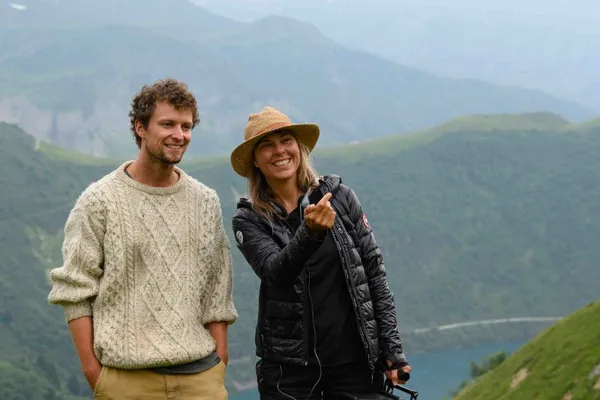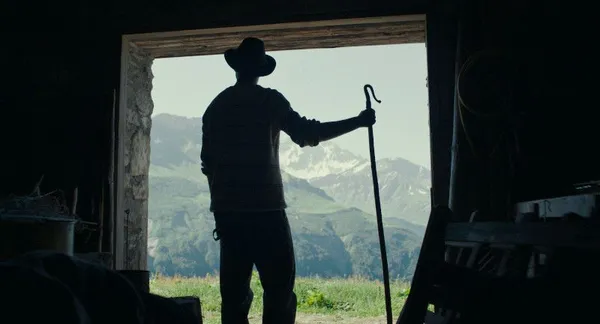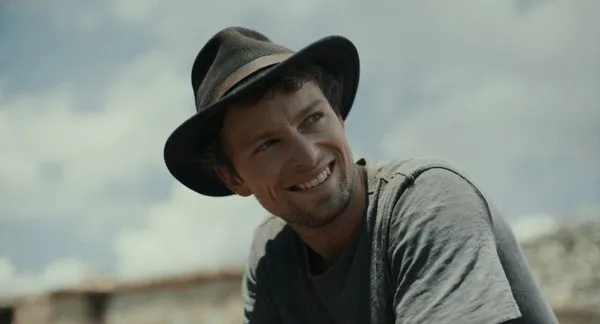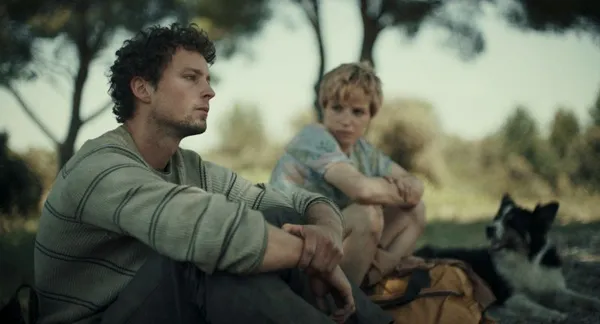Sophie Deraspe's Shepherds (Bergers) transports us to the south of France where young Canadian Mathyas (Félix-Antoine Duval) has relocated from Montreal on impulse, with the romantic dream of becoming a sheep herder and writing a book about it. Based on the semi-autographic Where Are You From, Shepherd? (D'Ou Viens-tu, Berger) it relates his experience of attempting to find his feet in the shepherding world at the same time as embarking on a relationship with a young bureacrat he meets, Élise (Solène Rigot), who makes an impetuous decision of her own.
This gentle drama, which has a strong documentary feel, follows the pair as they take the sheep up to a mountain pasture, facing challenges along the way. Shepherds had its world premiere at Toronto Film Festival and we caught up with Deraspe to talk about bringing the book to the screen and the challenges of working with wide open spaces and animals.
How did you first come across the story?
Sophie Deraspe: The book by Mathyas Lefebure was quite successful in Quebec, where Matthias is from. I wasn't in the process at that moment, but they got the rights to do the adaptation. So it came to me via the producers.
What did you think when you first read it?
SD: It's very well written, by a man who has a social commentary on work, on the modern world. He has a funny way to put it, he's philosophical, he's also sometimes an iconoclast - he knows so much about punk culture, classical culture, pop culture, and it's a great mix. But what he goes through is, at the same time, amazing, and we get to learn a lot. It felt like, there's a film but not an easy one. It's not obvious but at the same time, I think I just felt okay. I want to do it, but I said it with some candour, just the way he did when he wanted to become a shepherd, even if I had done films before, it felt like, “Okay, let's try it. Let's do it. I never thought it would take me, well, it's eight years from the time I read the novel and decided I would jump and we made our first trip to the south of France, with Mathyas himself and one of the producers.That was in 2016.
What sort of additional research did you have to do because presumably you had to get a feel for French countryside and farming customs?
SD: I didn't know much about this world. Now, I wouldn't say I'm an expert, but I have some experience and we've met with so many people, and we've spent time with them. It was needed in order to have their trust and their friendship, even in their will, to share their world. Without them, this shoot wouldn't have been possible.
They always say, never work with children or animals. You have herds of sheep running around, that must have been a challenge.
SD: Absolutely but, of course, the real shepherds stayed with us, some of them are on screen, and the care of the animals was theirs. The thing that I also found amazing from the book is it's not only a geographic journey for a North American young man who decides he will embrace the south of France and the Alps. It's also a journey in time since there were shepherds walking with herds in this nomadic way of life with animals for 1000s of years. So that also interested me.
That sense of tradition comes across particularly when they're driving the sheep herd through the town and the people are coming out to greet them and a woman gives Élise a scarf. You feel like maybe that's something that her family's been doing for generations.
SD: I've seen the film hundreds of times, the different cuts, but I'm still moved by this lady, whose name is Genevieve. She came to the casting because I was looking for someone from the area. It was her first time doing something for a film. But, when I see her, I see the little girl she was watching the herd coming through her village and, and now in her 90s she still wants to see the herd coming through the village, and I'm very touched by this simple moment.
I imagine you’d need to almost have a documentary sensibility when you were shooting this film because I guess you can get an animal to do something but they won't do it twice in the same way. So you must always have to be sort of ready to capture whatever is happening.
SD: Absolutely. We had to prepare a lot and be ready a year in advance, because the way the shepherds and animals live is directed by seasons. At one point we thought we wouldn't make it because it’s not only one herd with one farm, it’s many different ones and we had to move geographically. I'm so glad we are here and we've done it, but it was so much work. At the same time, when we were shooting, it felt like, “Okay, we need to be flexible. We need to allow ourselves to move quickly if it doesn't go the way we expected it to”.
 |
| Sophie Deraspe and Félix-Antoine Duval during the shoot Photo: Claire Nicol |
And this also brings some magic during the research and scouting. It happened to me that I was alone with a ewe that was giving birth. I remember, the shepherdess had to leave and help her neighbour. And she said, “Okay, stay with stay with her and help her if needed”. And My only knowledge was Mathyas’ book that I had read. Of course, the animal knew what to do. So I was hoping those things would happen [on the shoot], but I couldn’t write it in a script. It won't happen the day I want it to happen but I'm, I'm glad it happened in another circumstance,
And you do capture the birth of a lamb on camera.
SD: Yes, it happened while we were walking with a herd, and it was at the end of the day. It was beautiful. The actor Félix-Antoine had the sweat and the dirt from the real walking. We had walkie-talkies, and we had almost 3000 sheep walking with us, and we got the message that at the end a ewe was giving birth. I was working with cinematographer Vincent Gonneville, who works his own steadicam, so it was great to be able just to move and catch it and go there with Félix-Antoine. When I prepared with him prior to shooting, I think the most important thing I told him is, “You cannot prepare that much, but the thing that you can do is to let your mind and heart and body and spirit open up to what can happen”.
 |
| Sophie Deraspe: 'It's not only a geographic journey... it's also a journey in time since there were shepherds walking with herds in this nomadic way of life with animals for 1000s of years' |
As you were working with the animals, getting the right cast who are prepared to go with the flow of the sheep must not have been an easy job either?
SD: Yes, some actors want the comfort of a great hotel and a lodge but at the same time, a lot of them also were like, “Oh, if you give me a playground that will nourish my work as an actor, I’m willing to do it.”
Did you prepare a lot with your actors beforehand? Presumably Félix-Antoine, in particular, would have to get used to being around the sheep.
SD: We had instructors, other shepherds teaching him but at the same time, that's his character’s journey to learn how to be a shepherd and I didn't want him to be too skillful. Since we were moving, we were shooting chronologically and we had to follow the grazing of the herd. So, we couldn't start with the mountain where he is skilled enough to take care of the animals, but he learned during shooting. The real shepherds and herders, they wanted to keep him,
How long did the shoot take?
SD: It took us 30 days and a few more days with a very small crew.
You seem to mostly be shooting with natural light.
SD: Yes, it's almost only natural light. And as you can imagine when we are in the cabin up in the mountains, we cannot bring a truck with equipment. We had pickup trucks to bring people and a camera and some stuff and a little lighting. But our preparation in terms of photography, was to know where the sun is as you walk with the herd and the real Shepherd. He does it every year in spring. He walks from the south of France to the Alps. It takes 17 days, and he knows his route, so, so we did it with him, and we picked the moments that we felt were interesting in terms of cinematography and then we would consider what was best.
We always liked to work against daylight - it was the best light for us. So we’d say, “Can we manage it so you arrive in the morning in this place” but that was our concern as filmmakers wanting to make great images. Their concerns are not the same. Their concerns are, “Okay, but if you want me to be there in the morning, it means we have to sleep close to where we'll start in the morning” - because they sleep outside - “But then I don't know if I'll find a spot”.
Tell me a bit about recreating the lightning storm in the film.
SD: Yes, we had to use VFX for that. We experienced a lightning storm once when we were shooting. But we really had to hide at that moment, because it can come very quickly. And I remember the sound man, he was alone in a car, because we learned as children, “Okay, if there's a thunderstorm, it will be safe in the car. So he ran into a car, but he thought he might die, because it was so strong. The story of the thunderstorm we have in the film was told to me by Mathyas. It wasn't in the book, but he told me the lightning hit the trees next to him and he said you really feel like you're nothing, like, you can disappear like that. His instinct was to follow what the dog was doing, and the dog was hiding so he felt he had to do that.
How was it for you and the crew too? You must have had to do a fair amount of walking and carrying of equipment.
SD: Prior to the shoot, we were prepping for it. The cinematographer was really at the gym because he’s the one with the camera and it’s quite heavy and he had to walk on uneven ground.
Mathyas isn't a shepherd any more, of course, now he’s a writer.Has he told you what he thinks of the finished film?
SD: He stayed a shepherd in the south of France for some years, then he wanted to write. He didn't have enough time to actually write so he had to stop it to do the writing. He came back to Montreal. He’s a writer now but one thing he did in Montreal is to bring sheep into the parks. They take care of the grass cutting and fertilising and families come to the parks to learn how to take care of the animals. In terms of the film, he read some of my versions of the script. And sometimes I would ask him for advice. He was respectful of my work, and he knew that the translation to film would leave some stuff out and bring new stuff in. He was very respectful of the artistic impulse behind this with that comes with this new medium. And he’s so moved by the final film.























